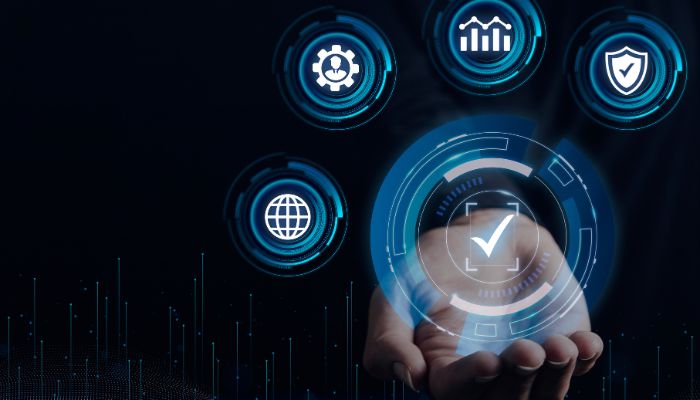One of the biggest challenges of a small and medium business (SMB) is to protect its digital assets from any kind of cyber attack. Small companies may not have ample resources to invest in the tools needed for a security strategy. Because of this, SMBs are preferred targets of cyber attacks. The Australian Cyber Security Centre conducted a Small Business Cyber Security Survey. The result showed that about 62% SMBs experienced cyber attacks at some point. What comes to notice is the reason for these attacks. More than 50% of the SMBs that participated in the survey had not spent more than $500 on cyber security in a year. Out of these, 1 in five SMBs had no idea what phishing was. This clearly states how most SMBs are not indulging in Managed Security practices, resulting in no protection from cyber attacks.
Perception and reality: A disconnect
In another report, Cisco stated that more than half of the SMBs in APAC were victims of cyber attacks and similar incidents in the last year, and about half of the cyber attacks cost around half a million. Despite a large number of cyber threats, a survey conducted in May 2022 by CNBC revealed that only 5% of small business owners thought of cyber security as a risk to their business.
The harsh reality is that cyber-attacks have a more significant impact on MSPs and these small businesses have a lot of pressure to ensure their infrastructure is secured along with their customers’ business.
A study from Coleman Parkes titled State of the Marker: The New Threat Landscape, which N-able commissioned, shows that most MSPs, in the last 18 months, have suffered a cyber attack. About 90% of the MSPs saw a rise in attacks since the pandemic began. This is not just it. 82% of customers of these MSPs also saw an increase in the number of attempted cyber attacks.
You might also be interested to read: 25 Top Technology Trends That Will Reign Over The Next Decade
Managed services providers to the rescue
This is where a robust managed security practice can help. When a business turns to a managed services provider, it gives the SMB access to complete security solutions. Managed services today are becoming more and more competitive. Hence, having the right security solutions can help serve as a significant advantage in the market.
ResearchAndMarkets has projected that the market for managed security services in Asia-Pacific will reach 5.8 billion by 2025. This growth may be driven due to factors like “the evolving threat landscape, increasing complexity of the business environment to address security across the information technology (IT), internet of things (IoT), operational technology (OT), and cloud infrastructure, along with the shortage of in-house security professionals and limited security tools.”
Building a robust managed security practice
A while ago, cyber security consisted of only three prongs; perimeter firewall protection, endpoint security and patch management. However, in today’s market, this is not enough to provide security. Managed services providers must provide more services to help their customers grow by protecting them from frequent complex cyber attacks.
However, managed services providers have challenges similar to SMBs competing in the market for highly qualified IT professionals. The market is already starved of talent, and fighting to get the best talent is honest and brutal. A recent survey by CompTIA showed that more than 1/4th of MSPs pointed out the large and ever-increasing skill gap as a significant concern.
How can an MSP provide managed security practice to many clients with a limited talent pool in such a situation? How can they find the necessary visibility to secure all the clients?
In reality, MSPs do not need to purchase the most advanced or latest tools designed for cyber security. Instead, they need to partner with a security provider that can offer them up-to-date solutions and high-quality technical support. This support includes managing, monitoring and securing the customers’ business environments so that the customer is satisfied and receives a good return on their investment.
Here is a list of 5 ways of managed security practice that MSPs can employ to monetise and optimise their cyber security services in partnership with the right technology provider.
1. Automated monitoring and management: Organisations today are moving towards automating specific processes in business so that their employees have more time and energy for work that has a higher value. Even hackers today are using automation, so if one wants to be protected by them, utilising automation is extremely necessary.
MSP personnel cannot be present in every customer’s office and do not even have the time that would allow them to intervene or monitor all day manually. Integrating solutions like Automation Manager from N-able can give MSPs the tool to automate tasks with a simple drag and drop motion. Even the onboarding process can be automated for new and existing customers, and automated remediation steps triggered by alerts can also be created. There are more than 100 tasks that can be automated and used by MSPs without learning any complicated language or code. The Automation Manager provided by N-able can enhance the ability to manage, monitor and secure the entire customer base.
2. Improve efficiency remotely: MSPs do not have the kind of time that one needs to monitor all clients manually at the same time. MSPs also cannot swivel from one admin console to another to service different sets of tools created for security. They need a single solution that gives them total visibility and the capability to manage all clients. N-able™ N-central® is a robust RMM solution that offers complete monitoring, endpoint protection, integrated patch management and hybrid solutions for backup. This helps to secure and streamline operations in a top-tier manner. The solutions offered by N-able™ N-central® allow the deployment of features as and when you need them over time. IT personnel are empowered by these tools to perform background maintenance that is seamless, non-disruptive and remote. This integrated automation helps in amplifying the ability of your workforce overnight.
3. Close the gap between backup and disaster recovery: Protection from ransomware involves securing data, and securing data involves ensuring there is a separate copy that can be recovered quickly because time is always of the absolute essence. If an MSP wishes to use solutions for data protection, N-able’s Cove Data Protection™ is worth considering. This solution is appliance free and backs up any device directly to the cloud. Cove Data Protection has a unique architecture that efficiently allows you to back up data every 15 minutes with minimal impact on your network’s bandwidth. All can be backed up from physical servers and workstations to Microsoft 365 and virtual servers. Cove Data protection also lets you perform restoration tasks seamlessly, be it restoration from a virtual environment, lost or corrupt file or a ransomware attack.
4. Endpoint protection that can be relied upon: Endpoint protection is often the last line of defence when an invasive attack on your data. This makes endpoint protection critical. However, signature-based protection is not very useful on the primary exploitation day. MSSPs need an Endpoint Detection and Response (EDR) solution that can protect and remediate an entire range of code threats. N-able™ N-central® and . N-able™ N-sight both have EDR functionality powered by SentinelOne. This monitors network and endpoint events. Specialists in the security industry can get absolute visibility into their customers’ devices with a single interface. They can use automation to provide security against code and traffic variants.
5. Secure credentials and a gamut of digital assets: When Managed Security Practice relies on passwords as a security method for corporate accounts, it makes them vulnerable to data theft and network infiltration. A better strategy is to use robust platforms that provide credential protection like N-able Passportal, which provides security from external threats. N-able Passportal is cloud-based and automated, providing credential protection with the help of encryption to manage, store and retrieve credentials efficiently and quickly. SSL certificates, sensitive documents, and digital assets can also be secured using Passportal. The unique quality of Passportal is that it can be rebranded and resold as your company’s solution for password management, giving you a chance to generate additional revenue streams.
The future of managed security practice
MSPs should focus more on investing in a turnkey approach instead of investing in trending security tools. In a turkey approach, new abilities can be integrated into an existing platform and let the platform evolve as threats evolve. N-able provides a security portfolio that is all-in-one and helps MSPs secure customers’ digital assets.
MSPs can also use N-able Market Builder if they wish to deploy campaigns for marketing and manage a database of their emails. This also helps them market their company and brand and create a security practice that caters to clients’ needs with next-generation sensibilities.
MSPs should also try and get access to training solutions that keep them up to date with the latest technology threats. This is because Managed Security practices must keep evolving the solutions they offer clients, have awareness about regulatory mandates and climb up the value chain. The N-able MSP Institute offers training to empower Managed Security Practice teams to be efficient and effective in each aspect of the business.
N-able has a functional team of more than 24 experts in Sydney, which includes managers for partner success that form a part of N-able’s global MSP “partner enablement program”. With these initiatives, a community is created where experts and new team members can learn and pick from each other, benefit from insights provided by experts and share the best forms of practice in the industry. People prefer to turn to their peers first before approaching anyone else. This programme helps foster engagement and encourages the members of the Managed Security Practice community to communicate with each other.
Reference: Five Ways MSPs Can Build a Next-Gen Managed Security Practice |Spiceworks|Brad Rudisail|July 27, 2022
You might also be interested to read: Importance Of Cybersecurity Training To Identify And Respond To Phishing Attacks






